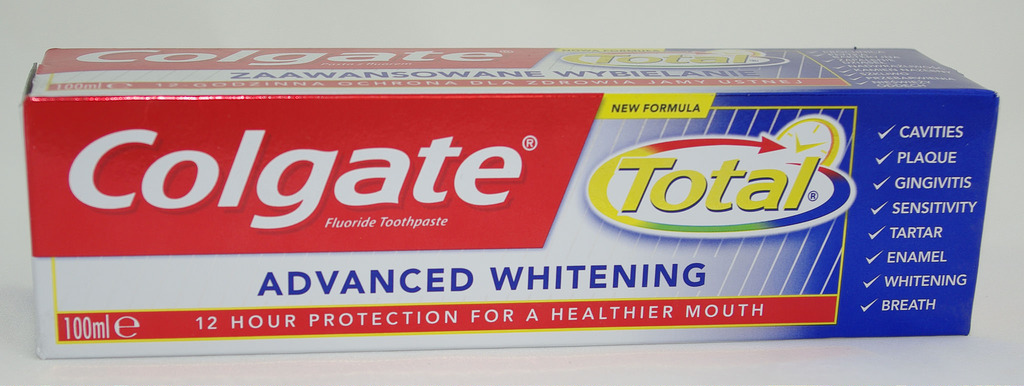Dangerous products in your bathroom?
 Triclosan and triclocarban are two potentially dangerous antimicrobial ingredients that can be found in many consumer products. These two ingredients as well as 17 other antimicrobial ingredients were banned by the U.S. Food and Drug Administration (FDA) last September in “antiseptic wash products that are intended for use with water and are rinsed off after use, including hand washes and body washes”. However the scope of the FDA final rule was too narrow and many consumer products such as Colgate’s Total toothpaste still contain these dangerous ingredients.
Triclosan and triclocarban are two potentially dangerous antimicrobial ingredients that can be found in many consumer products. These two ingredients as well as 17 other antimicrobial ingredients were banned by the U.S. Food and Drug Administration (FDA) last September in “antiseptic wash products that are intended for use with water and are rinsed off after use, including hand washes and body washes”. However the scope of the FDA final rule was too narrow and many consumer products such as Colgate’s Total toothpaste still contain these dangerous ingredients.
According to “The Florence Statement on Triclosan and Triclocarban”, a recent scientific statement published by the journal “Environmental Health Perspectives”, the usage of these two chemicals is still widespread. Because they are mostly used in wash products, they end up in the sink with the water and have negative repercussions on the environment. They have been detected in aquatic plants and animals as well as in human blood and breast milk. It is present in the urine of most humans. Previous studies have linked Triclosan and Triclocvarban to developmental problems in animals. They may potentially affect pregnant womenand harm human fetuses and newborns.
In the “The Florence Statement on Triclosan and Triclocarban” the scientific community, health professionals from all around the world and various US universities and medical institutions are urging manufacturers around the world to limit or to stop using these ingredients in their products. They also ask that regulatory authorities such as the FDA re-evaluate the safety of these chemicals and to make sure that products that still contain them are banned or at least clearly labelled.
The FDA started to evaluate the dangers of antimicrobial ingredients in consumer products in 1974. It took the agency more than 40 years to acknowledge that not only products containing Triclosan and Triclocraban were not better at preventing diseases than regular soap and water but that they also could potentially harm humans in the long-term.
 New York Personal Injury Attorneys Blog
New York Personal Injury Attorneys Blog


